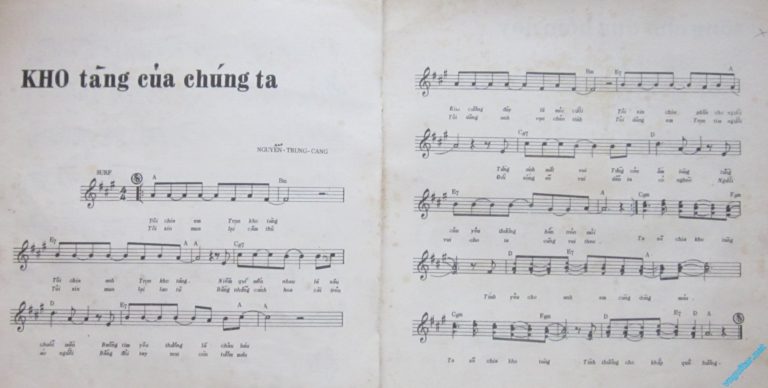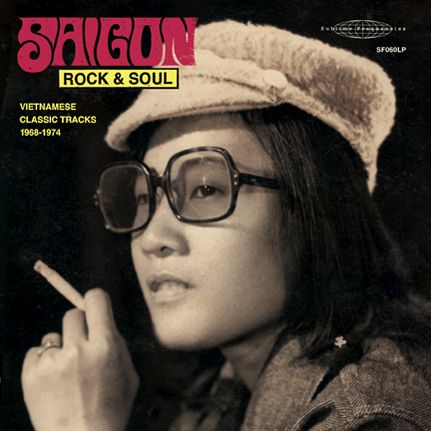Nguyễn Trung Cang’s song “Our Treasure” (“Kho tang của chúng ta,” 1971?) is an idealistic celebration of love and friendship that was composed in the Republic of Vietnam (RVN, or South Vietnam) in the early 1970s. The song’s narrator considers such sentiments to be the greatest treasure of all, compares them to priceless jewels, and offers to share this intangible wealth to his/her compatriots. In contrast, s/he dismisses the value of material possessions. “Our Treasure” is the thirteenth track on Saigon Rock & Soul, and this post is a continuation of my mini-series translating the lyrics from that CD.
The rejection of materialism in “Our Treasure” is similar to another song by Nguyễn Trung Cang, “A Cocky Song” (“Bài ca ngông”), except that the latter song valorizes freedom from materialism rather than the superiority of love over materialism. As I explained in my last post on “A Cocky Song,” I think the critique of materialism in South Vietnamese music was a youthful response to the growing preoccupation with wealth and status in the RVN. Of course, the valorization of love over material wealth is a ubiquitous theme in art throughout the world, but I think “Our Treasure” also reflected the local cultural context of wartime Vietnam.

In fact, both “Our Treasure” and “A Cocky Song” are mildly antiwar. Whereas the latter merely hints at the desire for peace, “Our Treasure” devotes two entire stanzas to the theme. In the third stanza, the song’s narrator asks to buy back the hatred and prisons that listeners would have known were associated with the war and offers to pay with the “pairs of tender hands still dripping with blood” (đôi tay non còn rướm máu), which presumably refers to young soldiers. In the last stanza, the narrator wants to share his/her love with “brothers and sisters of the same blood” (anh em cùng dòng máu), a phrase that appeals to a shared Vietnamese identity, and to spread this love across the entire country, which presumably included the communist Democratic Republic of Vietnam (North Vietnam). These features – the renunciation of hate, a celebration of shared identity, and the claim of a unitary territory – were common in antiwar music in the RVN. Many of these same features are found in the songs of Trịnh Công Sơn, undoubtedly the most famous antiwar musician at the time.
Nguyễn Trung Cang wrote “Our Treasure” for his band, Phượng Hoàng (Phoenix), and this version of the song was performed by the band’s frontman Elvis Phương. The software I am using does not allow for footnotes on some posts, so they appear below my translation but are not linked. Please note that the recording of “Our Treasure” and the sheet music differ slightly in the lyrics. When they disagree, I have rendered the recorded version in red and used that as the basis of my translation.
KHO TANG CỦA CHÚNG TA
Nhac và lời của Nguyễn Trung Cang
Tôi chia em trọn kho tàng
Tôi chia anh trọn kho tàng
Niềm quý mến nhau là xâu chuỗi mầu
Buồng tim thương yêu là châu báu
[CD version:] Buồng tim yêu thương là châu báu
Kim cương đây là môi cười
Tôi xin chia phần cho người
Từng ánh mắt vui từng câu ấm lòng
Từng câu yêu thương hằn trên môi
[CD version:] Từng câu thương yêu hằn trên môi
Tôi xin mua lại căm thù
Tôi xin mua lại lao tù
Bằng những cánh hoa cài trên áo người
Bằng đôi tay non còn rướm máu
Tôi dâng anh vạn chân tình
Tôi dâng em trọn tim người
[CD version:] Tôi dâng em trọn tim mình
Đời sống sẽ vui dầu ta có nghèo
Người vui cho ta cùng vui theo
Ta sẽ chia kho tàng
Tình yêu cho anh em cùng dòng máu
Ta sẽ chia kho tàng
Tình thương cho khắp quê hương
OUR TREASURE
Music and lyrics by Nguyễn Trung Cang
Original translation by Nu-Anh Tran
I’m sharing all my treasures with you, sister,1
I’m sharing all my treasures with you, brother,2
Our affection for each other is a colorful necklace,
The loving chambers of our hearts are jewels.
Diamonds [to me] are smiling lips,
Let me give others their share
Of each twinkle in my eyes, each heart-warming word,
Each expression of love that leaves a crease on my lips.
Let me buy back the hate,
Let me buy back the prisons,
[I’ll pay] with the flower petals pinned to people’s shirts,
[I’ll pay] with pairs of tender hands still dripping with blood.
I’m offering you my true feelings by the thousands,3 brother,
I’m offering you my whole heart, sister.
Life will be happy even if we’re poor,
The happiness of others will make us happy too.
Chorus:
I’ll share my treasure:
My love for brothers and sisters of the same blood.
I’ll share my treasure:
My love for the whole homeland.
Notes
1 em (“younger sibling”): A second-or third-person pronoun that a speaker can use to refer to anyone that is younger in age or junior in status. The word does not indicate gender.
2 anh (“older brother”): A second-or third-person pronoun that a speaker can use to refer to males that are older or higher in status. The first and second lines of the song are paired to express the narrator’s desire to share his/her treasure with many people. When used together as a pair, anh em (“older sibling, younger sibling”) is typically translated as “brothers” or “brothers and sisters.” I have chosen to translate em in the first line as “sister” rather than “brother” to avoid repetition in English.
3 vạn (“ten thousand”): In music and literature, vạn is a literary way of expressing a very large, possibly indefinite, number rather than a specific amount.
THE TECHNICAL STUFF
The original lyrics are based on sheet music found here: https://vnguitar.net/threads/kho-tang-cua-chung-ta-nguyen-trung-cang.5533/https://vnguitar.net/threads/kho-tang-cua-chung-ta-nguyen-trung-cang.5533/
The period recording can be found here: https://www.youtube.com/watch?v=S9NhZHtQPuw
Image credit: https://www.sublimefrequencies.com/products/576864-saigon-rock-soul-vietnamese-classic-tracks-1968-1974

